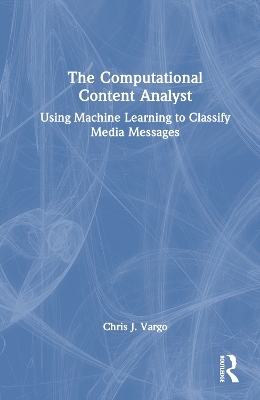
The Computational Content Analyst
Routledge (Verlag)
978-1-032-84635-4 (ISBN)
Most digital content, whether it be thousands of news articles or millions of social media posts, is too large for the naked eye alone. Often, the advent of immense datasets requires a more productive approach to labeling media beyond a team of researchers. This book offers practical guidance and Python code to traverse the vast expanses of data—significantly enhancing productivity without compromising scholarly integrity. We’ll survey a wide array of computer-based classification approaches, focusing on easy-to-understand methodological explanations and best practices to ensure that your data is being labeled accurately and precisely. By reading this book, you should leave with an understanding of how to select the best computational content analysis methodology to your needs for the data and problem you have.
This guide gives researchers the tools they need to amplify their analytical reach through the integration of content analysis with computational classification approaches, including machine learning and the latest advancements in generative artificial intelligence (AI) and large language models (LLMs). It is particularly useful for academic researchers looking to classify media data and advanced scholars in mass communications research, media studies, digital communication, political communication, and journalism.
Complementing the book are online resources: datasets for practice, Python code scripts, extended exercise solutions, and practice quizzes for students, as well as test banks and essay prompts for instructors. Please visit www.routledge.com/9781032846354.
Chris J. Vargo is an Associate Professor in the College of Media, Communication, and Information and Leeds School of Business (Courtesy) at the University of Colorado Boulder, USA. His research primarily focuses on the intersection of computational media analytics and political communication, employing computational methods to enhance understanding in these areas.
Preface 1. Unveiling Content Analysis in the Contemporary Media Ecosystem 2. Designing a Computational Content Analysis: An Illustration from "Civic Engagement, Social Capital, and Ideological Extremity" 3. Basic Information Retrieval for Content Analysis 4. Supervised Machine Learning with BERT for Content Analysis 5. Text Classification of News Media Content Categories Using Deep Learning 6. Leveraging Generative AI for Content Analysis 7. Unveiling the Veiled: Topic Modeling as a Lens for Discovery 8. Extending Deep Learning to Image Content Analysis Appendix A: Codebook and Conceptual Definitions Appendix B: Deletion Themes
| Erscheinungsdatum | 25.09.2024 |
|---|---|
| Zusatzinfo | 1 Tables, black and white |
| Verlagsort | London |
| Sprache | englisch |
| Maße | 152 x 229 mm |
| Gewicht | 430 g |
| Themenwelt | Informatik ► Theorie / Studium ► Künstliche Intelligenz / Robotik |
| Sozialwissenschaften ► Kommunikation / Medien ► Kommunikationswissenschaft | |
| Sozialwissenschaften ► Kommunikation / Medien ► Medienwissenschaft | |
| ISBN-10 | 1-032-84635-6 / 1032846356 |
| ISBN-13 | 978-1-032-84635-4 / 9781032846354 |
| Zustand | Neuware |
| Informationen gemäß Produktsicherheitsverordnung (GPSR) | |
| Haben Sie eine Frage zum Produkt? |
aus dem Bereich


